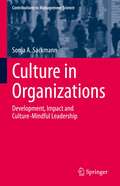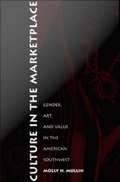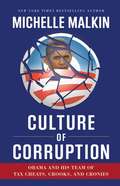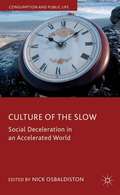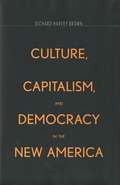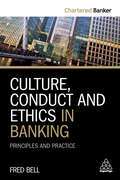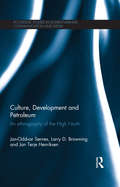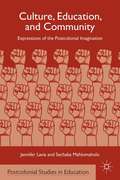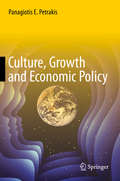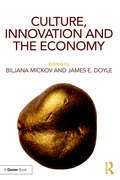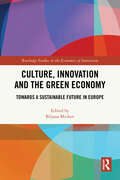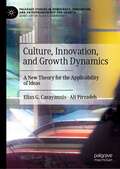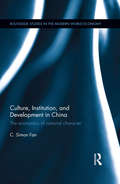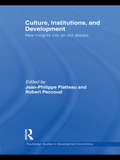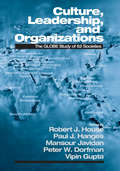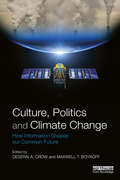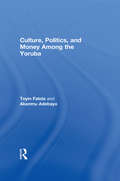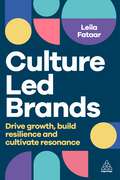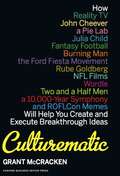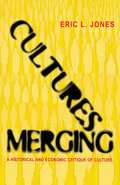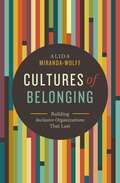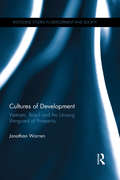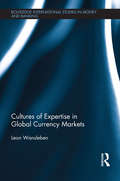- Table View
- List View
Culture in Organizations: Development, Impact and Culture-Mindful Leadership (Contributions to Management Science)
by Sonja A. Sackmann“Culture eats strategy for breakfast”. Peter Drucker’s provocative statement points to the importance of culture for organizations. Depending on its characteristics, culture contributes significantly to the success or failure of for-profit and not-for-profit organizations. Hence, managers and leaders need to have an understanding of this important concept for best results. This book provides relevant knowledge about the concept of culture. This includes its major characteristics and dimensions, the way culture functions and influences both the internal life of an organization and the resulting performance. The book describes the emergence and development of culture over time as well as the formation and influence of subcultures. Even though culture is always present, certain situations call for specific attention such as fast growth or stagnation, strategic alliances, M&As or situations of change. The book describes how to go about understanding and assessing an organization’s culture as a basis for culture change interventions as well as culture-sensitive and culture-mindful management and leadership.
Culture in the Marketplace: Gender, Art, and Value in the American Southwest
by Molly MullinIn the early twentieth century, a group of elite East coast women turned to the American Southwest in search of an alternative to European-derived concepts of culture. In Culture in the Marketplace Molly H. Mullin provides a detailed narrative of the growing influence that this network of women had on the Native American art market--as well as the influence these activities had on them--in order to investigate the social construction of value and the history of American concepts of culture. Drawing on fiction, memoirs, journalistic accounts, and extensive interviews with artists, collectors, and dealers, Mullin shows how anthropological notions of culture were used to valorize Indian art and create a Southwest Indian art market. By turning their attention to Indian affairs and art in Santa Fe, New Mexico, she argues, these women escaped the gender restrictions of their eastern communities and found ways of bridging public and private spheres of influence. Tourism, in turn, became a means of furthering this cultural colonization. Mullin traces the development of aesthetic worth as it was influenced not only by politics and profit but also by gender, class, and regional identities, revealing how notions of "culture" and "authenticity" are fundamentally social ones. She also shows how many of the institutions that the early patrons helped to establish continue to play an important role in the contemporary market for American Indian art. This book will appeal to audiences in cultural anthropology, art history, American studies, women's studies, and cultural history.
Culture of Corruption: Obama and His Team of Tax Cheats, Crooks, and Cronies
by Michelle MalkinIn her shocking new book, Malkin goes where the mainstream media refuse to tread. She digs deep into the records of President Obama's staff, revealing corrupt dealings, questionable pasts, and abuses of power throughout his administration.
Culture of the Slow
by Nick OsbaldistonAcross the world, there has been a growing dissatisfaction with the tempo of modern life. Described simply as the 'slow phenomenon', this volume explores this new brand of living that entails not simply slowing down but an embracing of alternative activities that promote meaning, thoughtfulness, engagement and authenticity.
Culture, Capitalism, and Democracy in the New America
by Richard Harvey BrownThe United States is in transit from an industrial to a postindustrial society, from a modern to postmodern culture, and from a national to a global economy. In this book Richard Harvey Brown asks how we can distinguish the uniquely American elements of these changes from more global influences. His answer focuses on the ways in which economic imperatives give shape to the shifting experience of being American. Drawing on a wide knowledge of American history and literature, the latest social science, and contemporary social issues, Brown investigates continuity and change in American race relations, politics, religion, conception of selfhood, families, and the arts. He paints a vivid picture of contemporary America, showing how postmodernism is perceived and felt by individuals and focusing attention on the strengths and limitations of American democracy.
Culture, Conduct and Ethics in Banking: Principles and Practice (Chartered Banker Series)
by Fred BellEndorsed by the Chartered Banker Institute as core reading for its professional qualifications, Culture, Conduct and Ethics in Banking emphasises the importance of professionalism for banks, and explores how all staff play a key role in putting customers at the heart of their business. Taking an applied approach, it aims to develop the capability of readers to: recognize and contribute towards balanced outcomes for consumers and organizations; understand the impact of reputational deficit; and understand the personal impact of an individual in the workplace.From a discussion of the main branches of ethical thinking to an overview of regulation and legislation in the UK and internationally, this book covers the theory and practice of conduct and professionalism in banking. Chapters contain activities and industry case studies, and further reading and viewing suggestions are included to help develop a deeper understanding of the topics covered. With fully referenced discussion of conflicts of interest, decision making models, the role of professional bodies, corporate governance, conduct risk management and the Global Financial Crisis 2007-08, Culture, Conduct and Ethics in Banking is the essential guide for finance professionals.
Culture, Development and Petroleum: An Ethnography of the High North (Routledge Studies in Environmental Communication and Media)
by Jan-Oddvar Sornes Larry Browning Jan Terje HenriksenThe discovery, just forty years ago, of vast oil and gas reserves in the Southwestern part of Norway, and more recently in the Arctic High North region, created an economic titan and posed a vast array of challenges for both the Norwegian government and the residents of this area. How to extract and transport all that oil and gas without despoiling the pristine environment? How to use this wealth in a socially responsible and sustainable way? How to prepare the rural High North citizens—traditionally fishermen and farmers—for a global, high-tech economy? Adopting an original narrative approach to qualitative research, this book tells the stories of 21 individuals either living or having a genuine interest in the High North, from mayors and entrepreneurs to farmers and fishermen. Through these first-hand meetings, it constructs an ethnographic study that reveals how petroleum and development have impacted on the regional economy and culture. This book will be of interest to all stakeholders in the oil and gas industry, and for students and scholars of organization studies, cultural and communication studies, environmental anthropology, natural resource management and sustainable development.
Culture, Economy and Politics: The Case of New Labour (New Directions in Cultural Policy Research)
by David Lee David Hesmondhalgh Kate Oakley Melissa NisbettThis book focuses on cultural policy in the UK between 1997 and 2010 under the Labour party (or 'New Labour', as it was temporarily rebranded). It is based on interviews with major figures and examines a range of policy areas including the arts, creative industries, copyright, film policy, heritage, urban regeneration and regional policy.
Culture, Education, and Community
by Jennifer Lavia Sechaba MahlomaholoLavia and Mahlomaholo re-examine how postcolonial theories might contribute to understandings about education in Culture, Education, and Community. They provide a critical space in which to interrogate the ways in which postcolonial voices are imagined and struggle to be valued, heard, and responded to. The book takes the imagination of the postcolonial and the experience of postcoloniality as its focus, acknowledging that postcolonialism is a troubling, unsettling, and ambiguous concept requiring re-visiting and re-interpretation.
Culture, Growth and Economic Policy
by Panagiotis E. PetrakisIt is a wide-spread belief that the cultural background inhered in a society affects the requirements of economic development. This relationship requires theoretical and empirical justification. The present book provides this together with an analysis of the development of cultural background itself. Cultural background is embodied in political institutions, in transactions, knowledge, incentives, in social capital, even in the tangibles of the economy. Thus, economic development is shaped and the rate of growth is affected. Conversely, economic development affects cultural background. When this interaction takes place at a non-developmental cultural background level, which is associated with low growth rates, then a growth trap is formed. Within such a growth trap, economic policy (public and monetary) is relatively deactivated and the conditions influencing the change in cultural background and its timing are of primary importance.
Culture, Innovation and the Economy
by James E. Doyle Biljana MickovThis is a handbook for the cultural entrepreneur, offering some of the best examples on practice, franchises, research, innovation and business opportunities in the cultural sector. The key theme is the contribution and possibilities of the cultural economy as a business, with a strong supporting subtext on innovative practice. The book illustrates the theme by providing multiple practice-based and empirical examples from an international panel of experts. Each contribution provides an accessible and easily accessed bank of knowledge on which existing practice can be grown and new projects undertaken. It provides an eclectic mix of possibilities that reinforce and underscore the full innovative and complex potential of the cultural economy. Topics include a review of the global and regional economic benefits of the cultural economy, evidence-based analysis of the culture industries, and an outline of the top ten cultural opportunities for business. This collection transcends the space between theory and practice to combine culture and innovation and understand their importance to a wider economy. This is essential reading for researchers and practitioners interested in entrepreneurship, non-profit management, art and visual culture, and public finance.
Culture, Innovation and the Green Economy: Towards a Sustainable Future in Europe (Routledge Studies in the Economics of Innovation)
by Biljana MickovThe book offers a theoretical and practical analysis of the contemporary approach to art, culture and innovation, with special emphasis on the relationship between culture, innovation and the economy, in the context of green transition, as an indispensable sustainability factor.It presents new models that can be implemented, especially within strategic cultural planning, serving to ensure future development and attain certain levels of stability. The book argues that the cultural ecosystem should not be treated as merely a segment of the economy, but rather as a system that contains the economy. One of the main issues covered in the book is climate change. More than fifty years have passed since the first major conference of the United Nations (UN) on the Environment held in Stockholm in 1972, which gave birth to the “Stockholm Declaration”, and also cemented the global environmental movement. Thanks to Agenda 2030, the 17 Sustainable Development Goals and the Paris Agreement, there is an increased awareness of the dangers posed by climate change and of the need to switch to sustainable energy sources and a circular economy in the hope of preventing environmental problems that threaten life on Earth. Each chapter provides an accessible bank of knowledge on which existing theory and practice can be developed and new projects undertaken.The book adopts a highly interdisciplinary approach for open science, bridging theoretical insights with practical applications, and offers a comprehensive perspective that is both informative and actionable, so it can be used by academics, researchers, policy makers and cultural professionals for planning and development within the cultural sector.Biljana Mickov is a cultural researcher and professor. She holds a PhD from University of Reims Champagne - Ardeen.
Culture, Innovation, and Growth Dynamics: A New Theory for the Applicability of Ideas (Palgrave Studies in Democracy, Innovation, and Entrepreneurship for Growth)
by Elias G. Carayannis Ali PirzadehThis book argues that ideas in the social realm are the context-bound products of distinct histories and cultures and thus cannot be co-opted across place and time. When ideas are used out of context, they become mere empty words that are depicted as absolute ideals, independent of the specific historical circumstances in which they were conceived. Therefore, highly ideologically guidelines based on one-size-fits-all principles are doomed to fail. The book emphasizes that the dominant Western intellectual paradigm has not improved human society in either Western or non-Western parts of the world. Some of the book's objectives are to rethink the dominant paradigm and invent a new world. We face an existential crisis that requires a new vision of the world and its well-being: one that is more inclusive and attentive to the diversity of people, histories, and cultures. We must remember that diversity in beliefs and values is the very essence of our humanity. This seminal work is essential reading for researchers of economic growth and development, political science, and innovation.
Culture, Institution, and Development in China: The economics of national character (Routledge Studies in the Modern World Economy)
by C. Simon FanHow does culture shape history, and history shape culture? This book answers this question by bringing readers on a fascinating journey through the evolution of Chinese culture, political and legal institutions, and "national character" of historical and contemporary China. It illustrates how "national character" evolves endogenously along with an institutional environment through the use of economic theories. Recognizing the unique role of "personality" in violence and social order – important variables that contribute to successful economies, the book provides a meaningful take on "personality" from the "average personality" of a country’s people. It analyses the relationship between culture, institution and "national character", providing gainful, interesting insights into the monumental transformation of China.
Culture, Institutions, and Development: New Insights Into an Old Debate (Routledge Studies In Development Economics Ser. #84)
by Jean-Philippe PlatteauDoes culture matter? This question has taken on added significance since fundamentalist revivalism has recently gained ground in different parts of the world. The old controversy between Max Weber and Karl Marx, which centres around the extent to which cultural factors such as social norms and values affect economic growth is of critical importance, particularly because of its policy implications. Indeed, if culture is not an autonomous factor susceptible to influencing economic realities, it should not matter and public authorities can dispense with thinking about cultural interventions. On the other hand, if culture does have a real impact, the question arises as to whether it is conducive or detrimental to economic growth, political liberalization, and the emancipation of individuals among other things. Culture, Institutions, and Development addresses this debate at a concrete level by looking at five important issues: the role of tradition and its influence on development; the role of religion, with special reference to Middle Eastern countries; the role of family, kinship, and ethnic ties in the process of development; the relationship between culture and entrepreneurship; and the relationship between culture and poverty. This collection offers a nuanced view that neither denies nor exaggerates the role of cultural factors in explaining relative growth performances across countries. Instead, the contributors focus on the dynamic, two-way relationship between culture and development in a way that stresses policy stakes and the value of multidisciplinary collaboration between economists, historians and other social scientists. This book will be of interest to postgraduates and researchers in all the social sciences, as well as to professionals working in national development agencies, international organisations, and Non-Governmental Organisations.
Culture, Leadership, and Organizations: The GLOBE Study of 62 Societies
by Dr Robert J. House Dr Peter W. Dorfman Dr Mansour Javidan Dr Paul J. Hanges Dr Vipin GuptaCulture, Leadership, and Organizations reports the results of a ten-year research program, the Global Leadership and Organizational Behavior Effectiveness (GLOBE) research program. GLOBE is a long-term program designed to conceptualize, operationalize, test, and validate a cross-level integrated theory of the relationship between culture and societal, organizational, and leadership effectiveness. A team of 160 scholars worked together since 1994 to study societal culture, organizational culture, and attributes of effective leadership in 62 cultures. Culture, Leadership, and Organizations: The GLOBE Study of 62 Societies reports the findings of the first two phases of GLOBE. The book is primarily based on the results of the survey of over 17,000 middle managers in three industries: banking, food processing, and telecommunications, as well as archival measures of country economic prosperity and the physical and psychological well-being of the cultures studied.
Culture, Politics and Climate Change: How Information Shapes our Common Future
by Maxwell T. Boykoff Deserai A. CrowFocusing on cultural values and norms as they are translated into politics and policy outcomes, this book presents a unique contribution in combining research from varied disciplines and from both the developed and developing world. This collection draws from multiple perspectives to present an overview of the knowledge related to our current understanding of climate change politics and culture. It is divided into four sections – Culture and Values, Communication and Media, Politics and Policy, and Future Directions in Climate Politics Scholarship – each followed by a commentary from a key expert in the field. The book includes analysis of the challenges and opportunities for establishing successful communication on climate change among scientists, the media, policy-makers, and activists. With an emphasis on the interrelation between social, cultural, and political aspects of climate change communication, this volume should be of interest to students and scholars of climate change, environment studies, environmental policy, communication, cultural studies, media studies, politics, sociology.
Culture, Politics, and Money Among the Yoruba
by Akanmu AdebayoThis masterful book investigates and analyzes several aspects of money among the Yoruba of Nigeria. Falola and Adebayo explore the origin, philosophy, uses, politics, and problems of acquiring and spending money in Yoruba culture. No prior book exists on this aspect of a major ethnic group in Africa with established connections with the black Diaspora in North America and the Caribbean. Conceived so that each chapter may be read individually, the volume is divided into three parts. Part 1, "Money and Its Uses," focuses on the transition from barter to cowry currency, the idealistic and pragmatic views of money, the impact of monetization on social stratification, accumulation among members of the elite, and the development of savings, banking, and credit institutions. Part 2, "Money and Its Problems," investigates the social, political, and cultural problems of money, including money-lending, theft, counterfeiting, and corruption. Part 3, "Money and Oil Economy," assesses the impact of the oil industry on the Nigerian state and examines both the positive and negative effects of oil money on Yoruba economy, society, and spending. Concluding chapters detail efforts to arrest the crisis that followed the economic slump after the oil boom and led to the adoption of the Structural Adjustment Program, and also evaluate the effects of currency devaluation on personal and communal responsibilities and social payment. Culture, Politics, and Money Among the Yoruba is timely in view of ongoing political and economic changes in Africa. It will be of interest to economists, sociologists, and African studies specialists.
Culture-Led Brands: Drive Growth, Build Resilience and Cultivate Resonance
by Leila FataarIn a world of relentless change and pervasive uncertainty, brands can only thrive if they become adept at reading and responding to cultural currents and signals. Today, cultural relevance is not just a marketing output, but a foundational element of successful contemporary business strategy. Brands no longer operate in a vacuum; instead, they are active participants in a global dialogue impacting culture and communities, both geographical and through fandoms. This book equips leaders with the tools to navigate this rapidly evolving business landscape, embracing uncertainty and harnessing cultural relevance to drive growth. Covering everything from marketing to commerce, innovation and creativity, political sensitivity and technology transformations all the way to diversity and inclusion, environmental consciousness and how to credibly leverage the influence of cultural voices, this book enables you to build a culture-led growth strategy and create a resilient brand. With real-world examples from brands like adidas Originals, Guinness and YouTube, this book provides a practical framework for embedding cultural relevance throughout your entire brand. It encourages leaders to rethink not just their external messaging, but their internal values and operations to create a culture-led branding and business strategy that is adaptive, authentic and accountable.
Culture: A Force for Alignment
by Jay W. Lorsch Thomas J. TierneyThe firms that endure manage their culture to minimize the stress of change, turn to it as a reminder of their course in the face of new challenges, and work to change it to adapt to new circumstances. This chapter focuses on culture as central to shaping behavior and attracting and retaining stars, and discusses how it can be--and must be--managed.
Culturematic
by Grant MccrackenWelcome to Culturematic: How Reality TV, John Cheever, a Pie Lab, Julia Child, Fantasy Football, Burning Man, the Ford Fiesta Movement, Rube Goldberg, NFL Films, Wordle, Two and a Half Men, a 10,000-Year Symphony, and ROFLCom Memes Will Help You Create and Execute Breakthrough IdeasA Culturematic is a little machine for making culture. It's an ingenuity engine.Once wound up and released, the Culturematic acts as a probe into the often-alien world of contemporary culture, to test the atmosphere, to see what life it can sustain, to see who responds and how. Culturematics start small but can scale up ferociously, bootstrapping themselves as they go.Because they are so inexpensive, we can afford to fire off a multitude of Culturematics simultaneously. This is evolutionary strategy, iterative innovation, and rapid prototyping all at once. Culturematics are fast, cheap, and out of control. Perhaps as important, they fail early and often. They are the perfect antidote to a world where we cannot guess what's coming next.In Culturematic, anthropologist Grant McCracken describes these little machines and helps the reader master them. Examples are drawn from NFL Films, Twitter, the Apple Genius Bar, Starbucks, Ford, SNL Digital Shorts, Restoration Hardware, UNICEF, J. Crew, Pie Lab, USA Network, and the GEICO gecko.For the traditional producers of culture-the creators of movies, design, advertising, publishing, magazines, newspapers, and corporate R&D-this book will inspire new innovation and creativity.For the emerging producers of culture-the digital players-this book will serve as a practical handbook. Culturematic: our app for creating the world anew.
Cultures Merging: A Historical and Economic Critique of Culture (The Princeton Economic History of the Western World #18)
by Eric L. Jones"Economists agree about many things--contrary to popular opinion--but the majority agree about culture only in the sense that they no longer give it much thought." So begins the first chapter of Cultures Merging, in which Eric Jones--one of the world's leading economic historians--takes an eloquent, pointed, and personal look at the question of whether culture determines economics or is instead determined by it. Bringing immense learning and originality to the issue of cultural change over the long-term course of global economic history, Jones questions cultural explanations of much social behavior in Europe, East Asia, the United States, Australia, and the Middle East. He also examines contemporary globalization, arguing that while centuries of economic competition have resulted in the merging of cultures into fewer and larger units, these changes have led to exciting new syntheses. Culture matters to economic outcomes, Jones argues, but cultures in turn never stop responding to market forces, even if some elements of culture stubbornly persist beyond the time when they can be explained by current economic pressures. In the longer run, however, cultures show a fluidity that will astonish some cultural determinists. Jones concludes that culture's "ghostly transit through history" is much less powerful than noneconomists often claim, yet it has a greater influence than economists usually admit. The product of a lifetime of reading and thinking on culture and economics, a work of history and an analysis of the contemporary world, Cultures Merging will be essential reading for anyone concerned about the interaction of cultures and markets around the world.
Cultures of Belonging: Building Inclusive Organizations that Last
by Alida Miranda-WolffClear, actionable steps for you to build new values, experiences, and perspectives into your organizational culture, infusing it with the diversity, inclusion, and belonging employees need to feel accepted, be their best selves, and do their best work.Bypass the faulty processes and communication styles that make change impossible in so many other organizations; access these practical tools and ideas for increasing diversity, equity, and inclusion (DEI) in your company.Filled with actionable advice Alida Miranda-Wolff learned through her own struggles being an outsider in a work culture that did not value inclusion, and having since worked with over 60 organizations to prioritize DEI initiatives and all the value and richness it adds to the workplace, this roadmap helps leaders:Learn why creating an environment where everyone feels belonging is the new barometer for employee engagement.Develop an understanding of the key terms around DEI and why they matter. Assess where your organization is today.Define and take the small steps that build new muscle memory into an organizational culture.Increase employee engagement, collaboration, innovation, communication, and sense of belonging.Build confidence in how to solve future DEI-related challenges.Get buy-in from colleagues (and even resisters) who can clearly see how to move forward and why.Overcome any limiting work environment and build all new processes and communication priorities that allow your employees to be a part of something greater than themselves while your organization learns to value and embrace the unique experiences and perspective that each employee brings to the company.
Cultures of Development: Vietnam, Brazil and the Unsung Vanguard of Prosperity (Routledge Studies in Development and Society)
by Jonathan WarrenThe North Atlantic development establishment has had a blemished track record over the past 65 years. In addition to a sizeable portfolio of failure, the few economic success stories in the developing world, such as South Korea and China, have been achieved by rejecting the advice of Western experts. Despite these realities, debates within mainstream development studies have stagnated around a narrow, acultural emphasis on institutions or the size and role of government. Cultures of Development uses a contrapuntal comparison of Vietnam and Brazil to show why it is important for development scholars and practitioners to broaden their conceptualization of economies to include the socio-cultural. This smartly written book based on original, ethnographic research breathes new life into development studies by bringing cultural studies into conversation with development studies, with an emphasis on improving—rather than merely critiquing—market economies. The applied deployment of critical development studies, i.e., interpretive economics, results in a number of theoretical advances in both development and areas studies, demonstrating the economic importance of certain kinds of cultural work carried out by religious leaders, artists, activists, and educators. Most importantly, the reader comes to fully appreciate how economies are embedded within the subjectivities, discourses, symbols, rituals, norms, and values of a given society. This pioneering book revives development practice and policy by offering fresh insights and ideas about how development can be advanced. It will be of special interest to scholars and students of Development Studies, Sociology, Economics, Anthropology, and Area Studies.
Cultures of Expertise in Global Currency Markets (Routledge International Studies in Money and Banking)
by Leon WanslebenNotwithstanding financial crises, global foreign exchange markets have undergone a tremendous growth during the last two decades. Foreign exchange (FX) is often thought of as a site where economic actors exchange currencies for buying foreign goods or selling goods in foreign countries, but the FX markets are better understood as financial spheres, dominated by speculative actors. A key question is how this huge global speculative sphere has developed, and what maintains it. Thus far, global currency markets have been largely neglected by the new approaches to finance, and until now no study has existed to chart the interplay of their structural evolution and their shape as knowledge spheres. This new book offers a systematic study of FX markets from a knowledge sociological perspective, empirically focussing on analysts within these markets. It makes the argument that market structures are reflected in, and become stabilised by, distinct cultures of financial expertise. These cultures connect the actions and perceptions of loosely coupled, globally distributed market players, and establish shared sets of strategies of how to observe, valuate and invest. This highly original book will be of interest to scholars of economics, sociology and political science, and in particular to all those with an interest in the sociology of finance and the role of finance in the contemporary world.
